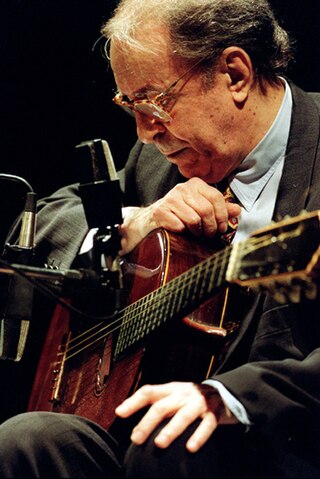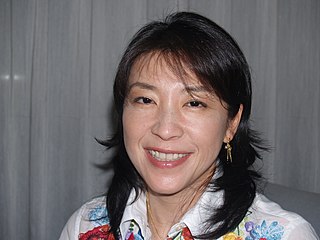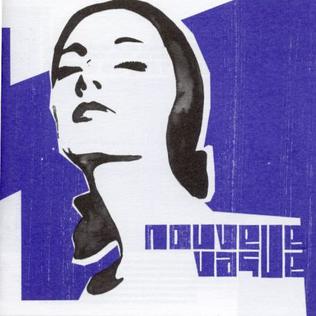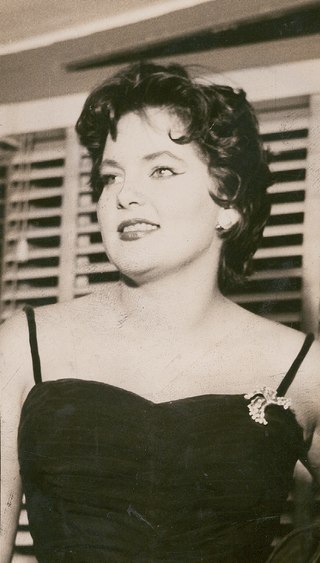Related Research Articles

Bossa nova is a relaxed style of samba developed in the late 1950s and early 1960s in Rio de Janeiro, Brazil. It is mainly characterized by a calm syncopated rhythm with chords and fingerstyle mimicking the beat of a samba groove, as if it was a simplification and stylization on the guitar of the rhythm produced by a samba school band. Another defining characteristic of the style is the use of unconventional chords in some cases with complex progressions and "ambiguous" harmonies. A common misconception is that these complex chords and harmonies were derived from jazz, but samba guitar players have been using similar arrangement structures since the early 1920s, indicating a case of parallel evolution of styles rather than a simple transference from jazz to bossa nova. Nevertheless, bossa nova was influenced by jazz, both in the harmonies used and also by the instrumentation of songs, and today many bossa nova songs are considered jazz standards. The popularity of bossa nova has helped to renew samba and contributed to the modernization of Brazilian music in general.

Antônio Carlos Brasileiro de Almeida Jobim, also known as Tom Jobim, was a Brazilian composer, pianist, guitarist, songwriter, arranger, and singer. Considered as one of the great exponents of Brazilian music, Jobim merged Samba with Cool jazz in the 1960s to create Bossa nova, with worldwide success. As a result, he is regarded as one of the fathers of bossa nova.

João Gilberto was a Brazilian guitarist, singer, and composer who was a pioneer of the musical genre of bossa nova in the late 1950s. Around the world, he was often called the "father of bossa nova"; in his native Brazil, he was referred to as "O Mito" . In 1965, the album Getz/Gilberto was the first jazz record to win the Grammy Award for Album of the Year. It also won Best Jazz Instrumental Album – Individual or Group and Best Engineered Album, Non-Classical. Nominated at the Grammy 1978 in the category Best Jazz Vocal Performance, album Amoroso, and winner category in Grammy 2001 with João voz e violão Best World Music Album.

Isabel Buarque de Hollanda Gilberto de Oliveira, known as Bebel Gilberto, is an American-born Brazilian popular singer often associated with bossa nova. She is the daughter of João Gilberto and singer Miúcha. Her uncle is singer/composer Chico Buarque.

Maria Bethânia Viana Teles Veloso is a Brazilian singer and songwriter. Born in Santo Amaro, Bahia, she started her career in Rio de Janeiro in 1964 with the show "Opinião" ("Opinion"), she is "The Queen of Brazilian Music". Due to its popularity, with performances all over the country, and the popularity of her 1965 single "Carcará", the artist became a star in Brazil.

Nouvelle Vague is a French cover band led by musicians Olivier Libaux and Marc Collin. Their name means "new wave" in French, and refers simultaneously to the French New Wave cinema movement of the 1960s, to the new wave music movement of the 1970s and 1980s, which provides many of the songs that the band covers, and to bossa nova, a musical style that the band frequently uses in its arrangements.

Camille Dalmais, better known by her mononym Camille, is a French singer.

Lisa Ono is a Brazilian-Japanese bossa nova singer.

Eliane Elias is a Brazilian jazz pianist, singer, composer and arranger.
"Waters of March" is a Brazilian song composed by Antônio Carlos Jobim (1927–1994) in 1972. Jobim wrote both the Portuguese and English lyrics. The lyrics, originally written in Portuguese, do not tell a story, but rather present a series of images that form a collage; nearly every line starts with "É...". In 2001, "Águas de março" was named as the all-time best Brazilian song in a poll of more than 200 Brazilian journalists, musicians and other artists conducted by Brazil's leading daily newspaper, Folha de S.Paulo. It was also voted by the Brazilian edition of Rolling Stone as the second greatest Brazilian song.

Nouvelle Vague is the debut studio album by the French band Nouvelle Vague. It was first released on 9 August 2004 on Peacefrog Records.

Bande à Part is the second studio album by the French band Nouvelle Vague. It was released on 14 June 2006 in Europe on Peacefrog Records. Like the band's eponymous first album, Bande à Part is a collection of bossa nova cover versions of 1980s new wave tracks.

Chiara Civello is an Italian singer, songwriter, pianist, and guitarist.

Maysa Figueira Monjardim, better known as Maysa Matarazzo, was a Brazilian singer-songwriter, performer and actress. She is also associated with Bossa nova music but is widely known as a torch song (fossa) interpreter.

Marcos Kostenbader Valle is a Brazilian singer, songwriter, and record producer. He has produced works in many musical styles, including bossa nova, samba, and fusions of rock, soul, jazz, and dance music with Brazilian styles. Valle is credited for popularizing bossa nova in the 1960s.

Astrud Gilberto was a Brazilian samba and bossa nova singer and songwriter. She gained international attention in the mid-1960s following her recording of the song "The Girl from Ipanema".

3 is the third studio album by the French band Nouvelle Vague. It was released 16 June 2009 on Peacefrog Records. As with their previous releases, the album consists entirely of cover versions of post-punk and new wave songs from the 1970s and 1980s. Four of the tracks are performed as duets, featuring the song's original vocalist performing alongside one of Nouvelle Vague's female singers.
Wanda Maria Ferreira de Sá is a Brazilian bossa nova singer and guitarist, active from 1964 to the present day.

Olivier Libaux was a French record producer, songwriter, and guitarist. A founding member of the band Les Objets, he was also the founder of the musical projects Nouvelle Vague and Uncovered Queens of the Stone Age.

Marc Collin is a French musician, film music composer and record producer. He is best known as the founder, with Olivier Libaux, of the project Nouvelle Vague, a cover band that covers new wave songs in a bossa nova style. Collin also released a side-project album in 2008 under his own name, titled Hollywood, mon amour, consisting of covers, on the Nouvelle Vague formula, of songs from 1980s film soundtracks. Collin stated that he did not embark on the project out of nostalgia for the films, but because he was drawn to the challenge of transforming extremely well-known hits into intimate tracks.
References
- ↑ https://www.facebook.com/nouvellevagueofficial [ user-generated source ]
- ↑ Telegraph reporters (31 July 2015). "The 50 best covers". "Terrific though it is, Depeche Mode's original Just Can't Get Enough can at times evoke stumbling around a suburban nightclub while cradling a warm shandy. Enter Gallic musos Marc Collin and Olivier Libaux, whose sublime bossa-nova reworking, with Rio-born singer Eloisia, whisks one instead straight to the sands of Ipanema, c1965. (Try their Nouvelle Vague album if this sounds your tasse de thé.)" The Telegraph. Retrieved 22 October 2016.